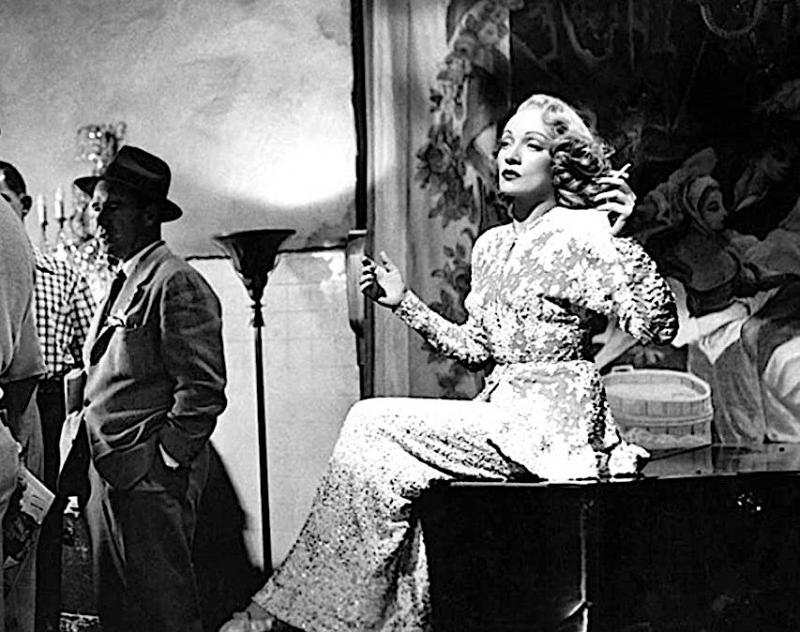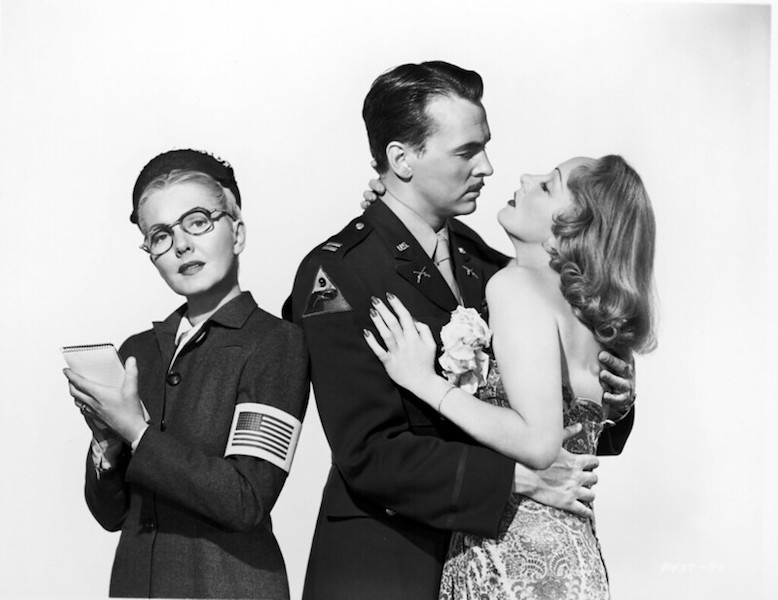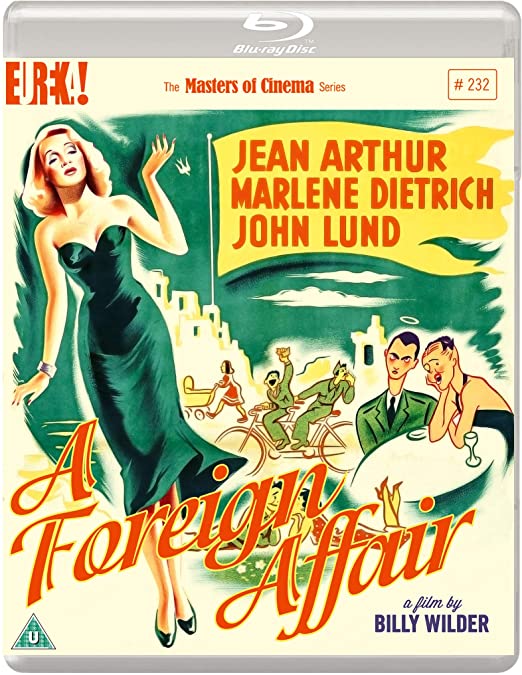Blu-Ray: A Foreign Affair | reviews, news & interviews
Blu-Ray: A Foreign Affair
Blu-Ray: A Foreign Affair
Billy Wilder and Marlene Dietrich weave that old black magic in their black market tale

In the year when we should be reflecting on seventy years of peace in Europe but are too occupied with present day viruses, Brexit, and racism to remember our past, it’s timely that a film about the Allied victors occupying Berlin in 1947 should be given a rerelease.
A Foreign Affair missed out on the Oscar for Best Black-and-White Cinematography to The Naked City, but Charles Lang’s aerial shots of a great city turned into a cross-hatched landscape of ruins provide a masterful opening to this neglected Billy Wilder black comedy. Looking down from the plane circling the wreckage, one American observes, "It looks like chicken innards at frying time". Later, the camera tracks through canyons of rubble, drawing on the morbid fascination that ruined cities inspire. These scenes rival the best newsreels and it’s wonderful to see them restored in this Blu-ray release.
The Austrian Jewish writer-director Wilder also lost out on Best Adapted Screenplay to John Huston’s The Treasure of the Sierra Madre. Perhaps Wilder’s refusal to condemn wholesale the compromises made by Germans during the Nazi era and his gentle mockery of the smugness of the occupying forces was just a little too much of a reminder to the Academy that Wilder, while embracing America, was never a native son.
A Foreign Affair is a tale of two women pursuing the same man, and it speaks volumes to the uneven casting that I couldn’t remember who played that man, having last seen the film in a battered 16mm print decades ago. Wilder cast the rather uninteresting John Lund as Captain John Pringle, an officer who has been enjoying too many of the carnal pleasures that a pack of cigarettes and some silk stockings could buy an American in the wreckage of Berlin. (Pictured below, Lund with Jean Arthur, left, and Marlene Dietrich in a publicity still.)
 Jean Arthur plays a Republican congresswoman who flies in from Washington on a moral mission: ‘Twelve thousand of our boys are being corrupted – our job is to fumigate them for their wives and girlfriends back home’. Arthur, who was the mistress of screwball comedy for Frank Capra, came out of retirement for Wilder and gives a fabulous turn as Phoebe Frost, an Iowan spinster who thaws into a giddy girl when she falls for the duplicitous Pringle.
Jean Arthur plays a Republican congresswoman who flies in from Washington on a moral mission: ‘Twelve thousand of our boys are being corrupted – our job is to fumigate them for their wives and girlfriends back home’. Arthur, who was the mistress of screwball comedy for Frank Capra, came out of retirement for Wilder and gives a fabulous turn as Phoebe Frost, an Iowan spinster who thaws into a giddy girl when she falls for the duplicitous Pringle.
But it’s Marlene Dietrich who steals the show. She plays Erika von Schlütow, a nightclub chanteuse mesmerising men in uniform in her basement cabaret – only their insignia has changed. Ever the vampish pragmatist, she dryly observes, "I have a new Führer now. Heil Johnny’. Formerly the mistress of a top Nazi, Erika has become the secret squeeze of Pringle, who brings food to her. However, she is under the observation of intelligence officers who are convinced she will lead them to her former lover, who is wanted for war crimes. Saving the film from being a self-righteous film noir, Wilder’s deft script spins around Pringle’s antics to protect his mistress while romancing the congresswoman
It was extraordinarily brave of Dietrich to take on the role of a decadent Nazi paramour in 1947. The film’s fake newsreels show her character at a party with Hitler, but the star had spent more time at the front entertaining the troops than Eisenhower himself had spent on the ground. The disk includes an extract from Volker Schlöndorff's 1988 interview with Wilder, in which the great raconteur explains how he knew Dietrich in pre-war Germany, when he was a journalist and she was a bit part actress, and how he coaxed her to play Erika. To Wilder, Dietrich and Berlin were synonymous, and to make his film without her was inconceivable.
 Wilder’s political message is serious. The aim of A Foreign Affair was to convince American tax payers that it was right for their country to help rebuild Germany. But Wilder delivers his plea with a light touch – what he describes as "philosophy with a chocolate coating". He snorts at the idea that he would have shown a concentration camp in a feature film. If only the Hollywood directors that have followed him over the years had paid attention and left it to documentaries, as Wilder did.
Wilder’s political message is serious. The aim of A Foreign Affair was to convince American tax payers that it was right for their country to help rebuild Germany. But Wilder delivers his plea with a light touch – what he describes as "philosophy with a chocolate coating". He snorts at the idea that he would have shown a concentration camp in a feature film. If only the Hollywood directors that have followed him over the years had paid attention and left it to documentaries, as Wilder did.
Film historian Joseph McBride provides an informative commentary, while the other supplements include radio adaptations of the script from 1949 and a somewhat pedestrian video essay by Kat Ellinger. But it’s the tantalising glimpse of Schlöndorff's three-hour interview with Wilder (which the BBC showed in a hacked-around version in 1992) that makes me long for a film company to fund a proper restoration with decent clips and improved subtitles.
The future of Arts Journalism
You can stop theartsdesk.com closing!
We urgently need financing to survive. Our fundraising drive has thus far raised £49,000 but we need to reach £100,000 or we will be forced to close. Please contribute here: https://gofund.me/c3f6033d
And if you can forward this information to anyone who might assist, we’d be grateful.

Subscribe to theartsdesk.com
Thank you for continuing to read our work on theartsdesk.com. For unlimited access to every article in its entirety, including our archive of more than 15,000 pieces, we're asking for £5 per month or £40 per year. We feel it's a very good deal, and hope you do too.
To take a subscription now simply click here.
And if you're looking for that extra gift for a friend or family member, why not treat them to a theartsdesk.com gift subscription?
more Film
 London Film Festival 2025 - crime, punishment, pop stars and shrinks
Daniel Craig investigates, Jodie Foster speaks French and Colin Farrell has a gambling habit
London Film Festival 2025 - crime, punishment, pop stars and shrinks
Daniel Craig investigates, Jodie Foster speaks French and Colin Farrell has a gambling habit
 I Swear review - taking stock of Tourette's
A sharp and moving tale of cuss-words and tics
I Swear review - taking stock of Tourette's
A sharp and moving tale of cuss-words and tics
 A House of Dynamite review - the final countdown
Kathryn Bigelow's cautionary tale sets the nuclear clock ticking again
A House of Dynamite review - the final countdown
Kathryn Bigelow's cautionary tale sets the nuclear clock ticking again
 theartsdesk Q&A: Idris Elba on playing a US President faced with a missile crisis in 'A House of Dynamite'
The star talks about Presidential decision-making when millions of lives are imperilled
theartsdesk Q&A: Idris Elba on playing a US President faced with a missile crisis in 'A House of Dynamite'
The star talks about Presidential decision-making when millions of lives are imperilled
 Urchin review - superb homeless drama
Frank Dillane gives a star-making turn in Harris Dickinson’s impressive directorial debut
Urchin review - superb homeless drama
Frank Dillane gives a star-making turn in Harris Dickinson’s impressive directorial debut
 Mr Blake at Your Service review - John Malkovich in unlikely role as an English butler
Weird comedy directed by novelist Gilles Legardinier
Mr Blake at Your Service review - John Malkovich in unlikely role as an English butler
Weird comedy directed by novelist Gilles Legardinier
 Don't Let's Go to the Dogs Tonight review - vivid adaptation of a memoir about a Rhodesian childhood
Embeth Davidtz delivers an impressive directing debut and an exceptional child star
Don't Let's Go to the Dogs Tonight review - vivid adaptation of a memoir about a Rhodesian childhood
Embeth Davidtz delivers an impressive directing debut and an exceptional child star
 One Battle After Another review - Paul Thomas Anderson satirises America's culture wars
Leonardo DiCaprio, Teyana Taylor, and Sean Penn star in a rollercoasting political thriller
One Battle After Another review - Paul Thomas Anderson satirises America's culture wars
Leonardo DiCaprio, Teyana Taylor, and Sean Penn star in a rollercoasting political thriller
 Steve review - educator in crisis
Cillian Murphy excels as a troubled headmaster working with delinquent boys
Steve review - educator in crisis
Cillian Murphy excels as a troubled headmaster working with delinquent boys
 Can I get a Witness? review - time to die before you get old
Ann Marie Fleming directs Sandra Oh in dystopian fantasy that fails to ignite
Can I get a Witness? review - time to die before you get old
Ann Marie Fleming directs Sandra Oh in dystopian fantasy that fails to ignite
 Happyend review - the kids are never alright
In this futuristic blackboard jungle everything is a bit too manicured
Happyend review - the kids are never alright
In this futuristic blackboard jungle everything is a bit too manicured

Add comment